Environmental Health: Policy Brief on Recycled Waste Water Issues
VerifiedAdded on 2023/06/05
|8
|2311
|277
Report
AI Summary
This report provides a comprehensive analysis of the health and environmental issues associated with recycled waste water. It begins by introducing the importance of water and the growing need for recycling due to increasing scarcity. The report then delves into the scope of the water recycling issue, highlighting its potential to address water shortages while also acknowledging the risks associated with using recycled waste water for drinking purposes. It explores the broader context of the problem, emphasizing the high population density as a major contributor to sewage water production and the challenges in obtaining environmental consents for recycling processes. The report details the potential consequences of waste water recycling, including soil dispersion, harm to plant growth, land eutrophication, and the presence of harmful chemicals that can disrupt animal endocrine functions. Furthermore, the report offers recommendations to combat these issues, such as investing in advanced water recycling infrastructure, implementing stricter regulations, promoting the use of different filtration techniques, and encouraging rainwater conservation. Finally, a self-reflection discusses the process of creating the policy brief and its intended impact on raising awareness about the complexities of water recycling.
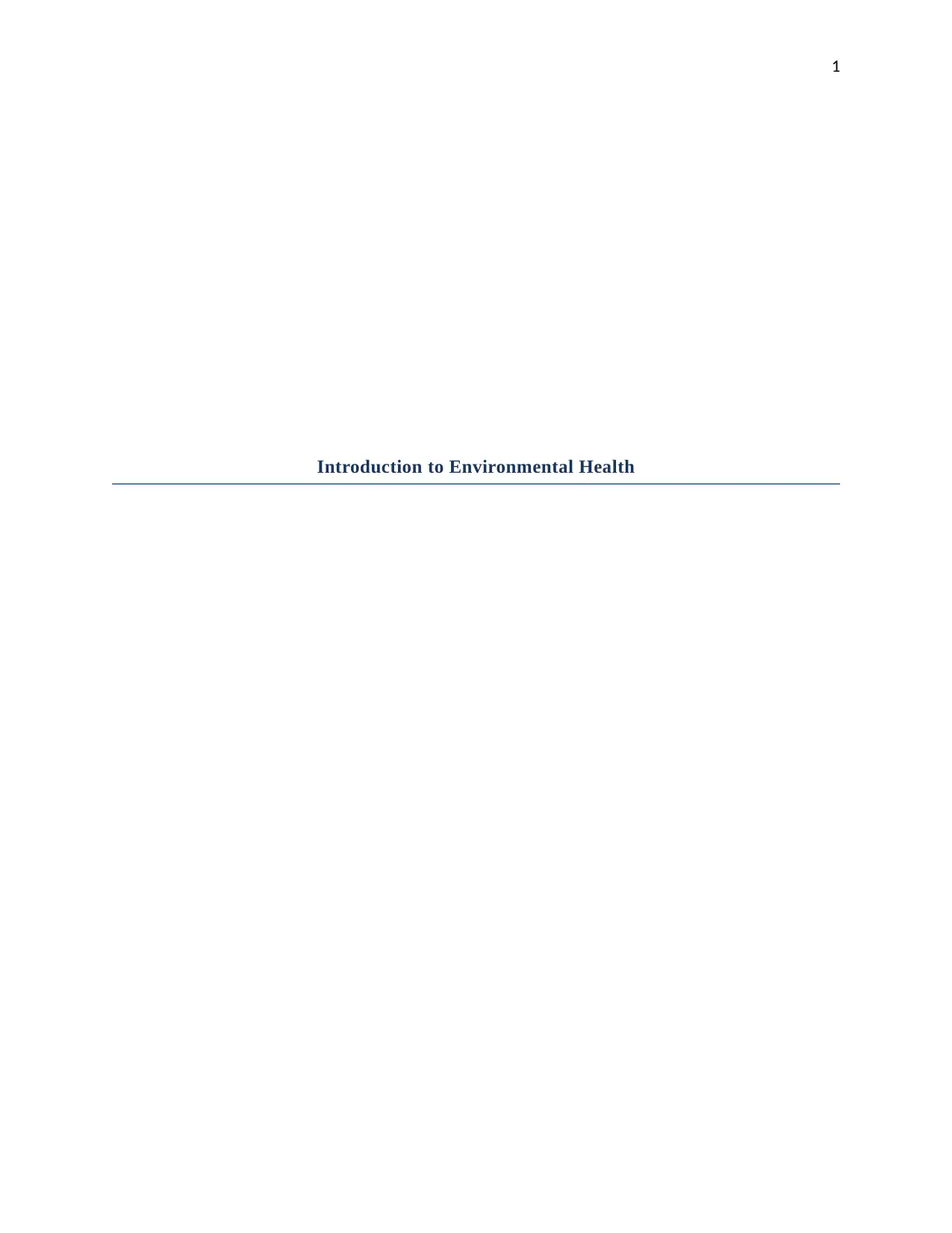
1
Introduction to Environmental Health
Introduction to Environmental Health
Paraphrase This Document
Need a fresh take? Get an instant paraphrase of this document with our AI Paraphraser
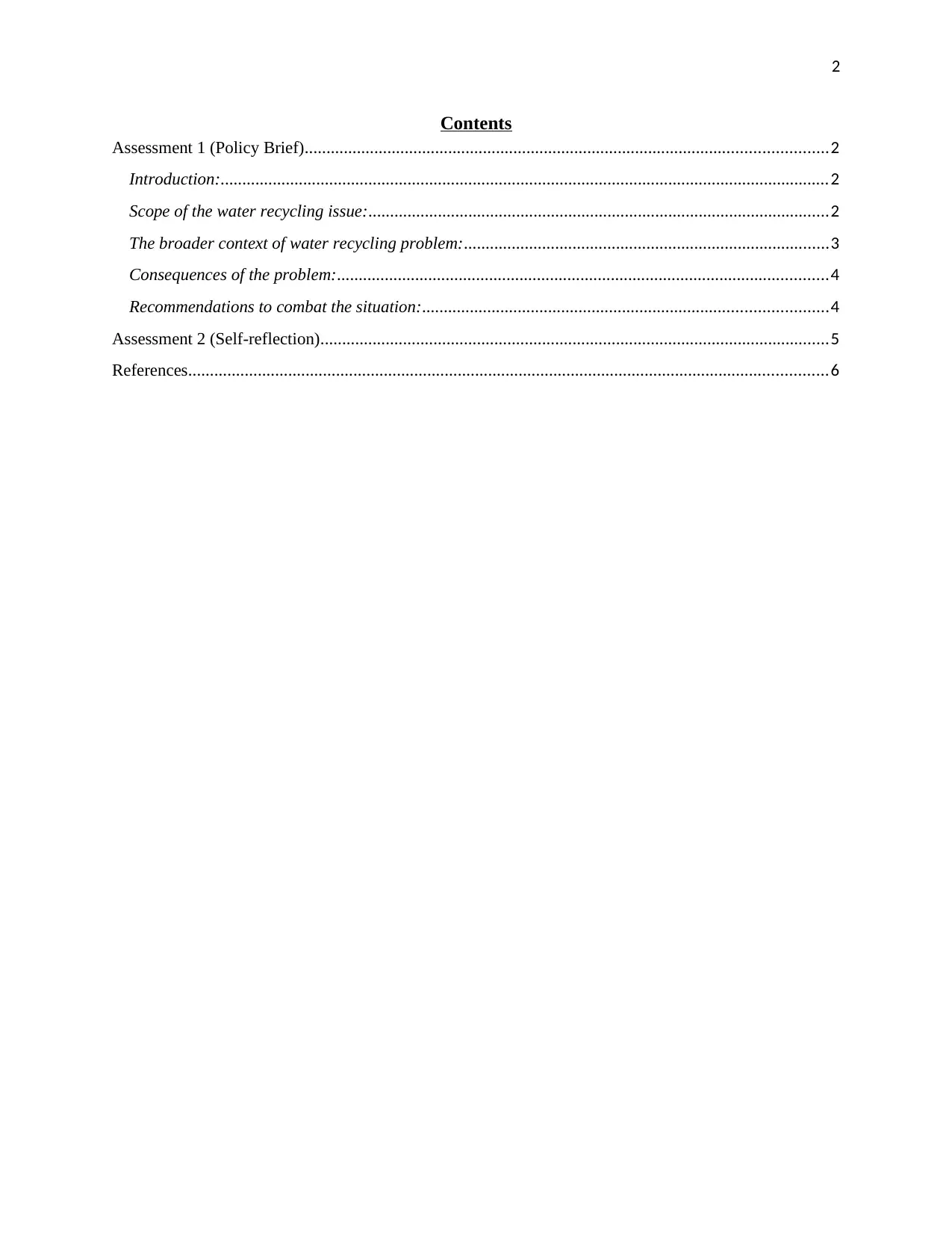
2
Contents
Assessment 1 (Policy Brief)........................................................................................................................2
Introduction:............................................................................................................................................2
Scope of the water recycling issue:..........................................................................................................2
The broader context of water recycling problem:....................................................................................3
Consequences of the problem:.................................................................................................................4
Recommendations to combat the situation:.............................................................................................4
Assessment 2 (Self-reflection).....................................................................................................................5
References...................................................................................................................................................6
Contents
Assessment 1 (Policy Brief)........................................................................................................................2
Introduction:............................................................................................................................................2
Scope of the water recycling issue:..........................................................................................................2
The broader context of water recycling problem:....................................................................................3
Consequences of the problem:.................................................................................................................4
Recommendations to combat the situation:.............................................................................................4
Assessment 2 (Self-reflection).....................................................................................................................5
References...................................................................................................................................................6
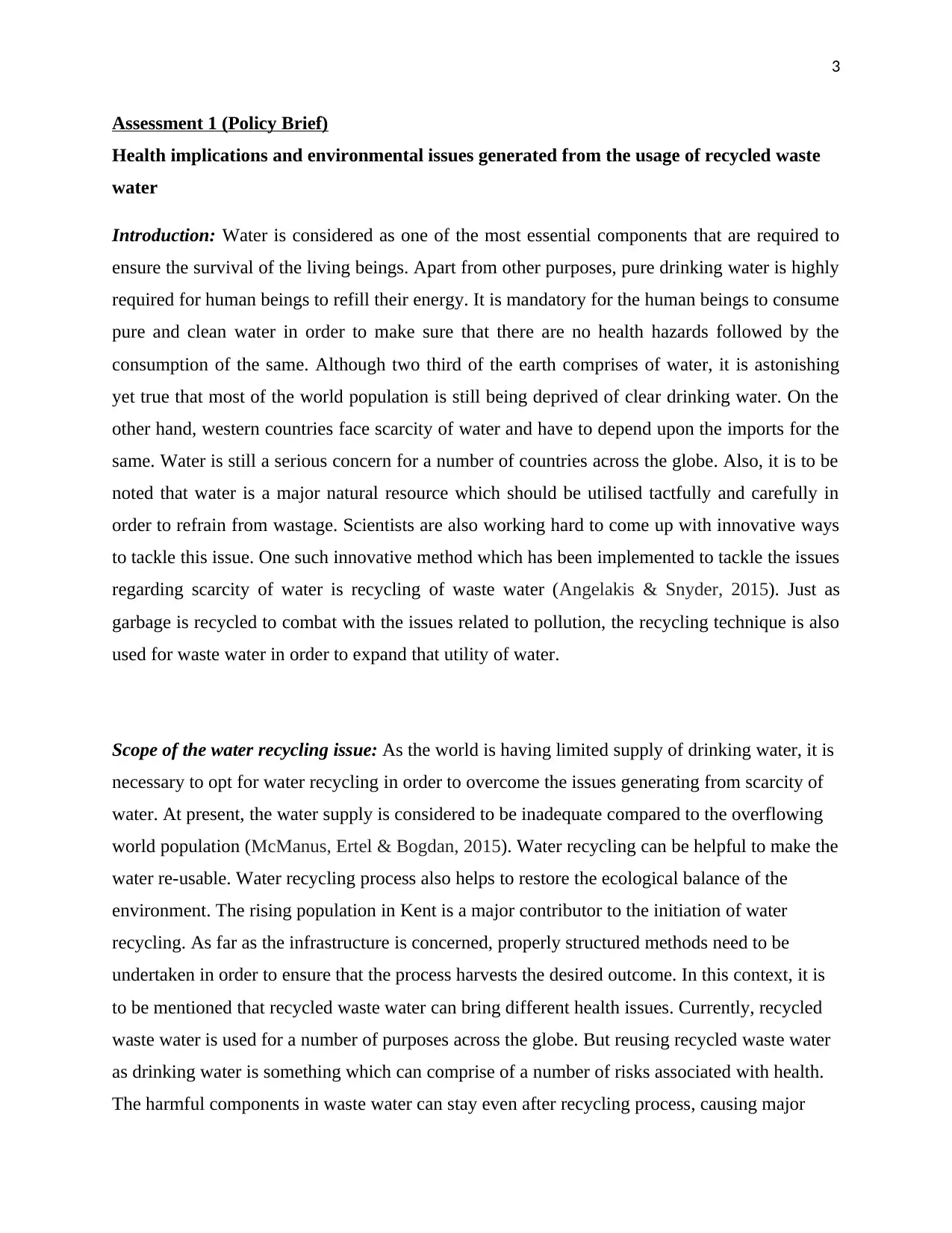
3
Assessment 1 (Policy Brief)
Health implications and environmental issues generated from the usage of recycled waste
water
Introduction: Water is considered as one of the most essential components that are required to
ensure the survival of the living beings. Apart from other purposes, pure drinking water is highly
required for human beings to refill their energy. It is mandatory for the human beings to consume
pure and clean water in order to make sure that there are no health hazards followed by the
consumption of the same. Although two third of the earth comprises of water, it is astonishing
yet true that most of the world population is still being deprived of clear drinking water. On the
other hand, western countries face scarcity of water and have to depend upon the imports for the
same. Water is still a serious concern for a number of countries across the globe. Also, it is to be
noted that water is a major natural resource which should be utilised tactfully and carefully in
order to refrain from wastage. Scientists are also working hard to come up with innovative ways
to tackle this issue. One such innovative method which has been implemented to tackle the issues
regarding scarcity of water is recycling of waste water (Angelakis & Snyder, 2015). Just as
garbage is recycled to combat with the issues related to pollution, the recycling technique is also
used for waste water in order to expand that utility of water.
Scope of the water recycling issue: As the world is having limited supply of drinking water, it is
necessary to opt for water recycling in order to overcome the issues generating from scarcity of
water. At present, the water supply is considered to be inadequate compared to the overflowing
world population (McManus, Ertel & Bogdan, 2015). Water recycling can be helpful to make the
water re-usable. Water recycling process also helps to restore the ecological balance of the
environment. The rising population in Kent is a major contributor to the initiation of water
recycling. As far as the infrastructure is concerned, properly structured methods need to be
undertaken in order to ensure that the process harvests the desired outcome. In this context, it is
to be mentioned that recycled waste water can bring different health issues. Currently, recycled
waste water is used for a number of purposes across the globe. But reusing recycled waste water
as drinking water is something which can comprise of a number of risks associated with health.
The harmful components in waste water can stay even after recycling process, causing major
Assessment 1 (Policy Brief)
Health implications and environmental issues generated from the usage of recycled waste
water
Introduction: Water is considered as one of the most essential components that are required to
ensure the survival of the living beings. Apart from other purposes, pure drinking water is highly
required for human beings to refill their energy. It is mandatory for the human beings to consume
pure and clean water in order to make sure that there are no health hazards followed by the
consumption of the same. Although two third of the earth comprises of water, it is astonishing
yet true that most of the world population is still being deprived of clear drinking water. On the
other hand, western countries face scarcity of water and have to depend upon the imports for the
same. Water is still a serious concern for a number of countries across the globe. Also, it is to be
noted that water is a major natural resource which should be utilised tactfully and carefully in
order to refrain from wastage. Scientists are also working hard to come up with innovative ways
to tackle this issue. One such innovative method which has been implemented to tackle the issues
regarding scarcity of water is recycling of waste water (Angelakis & Snyder, 2015). Just as
garbage is recycled to combat with the issues related to pollution, the recycling technique is also
used for waste water in order to expand that utility of water.
Scope of the water recycling issue: As the world is having limited supply of drinking water, it is
necessary to opt for water recycling in order to overcome the issues generating from scarcity of
water. At present, the water supply is considered to be inadequate compared to the overflowing
world population (McManus, Ertel & Bogdan, 2015). Water recycling can be helpful to make the
water re-usable. Water recycling process also helps to restore the ecological balance of the
environment. The rising population in Kent is a major contributor to the initiation of water
recycling. As far as the infrastructure is concerned, properly structured methods need to be
undertaken in order to ensure that the process harvests the desired outcome. In this context, it is
to be mentioned that recycled waste water can bring different health issues. Currently, recycled
waste water is used for a number of purposes across the globe. But reusing recycled waste water
as drinking water is something which can comprise of a number of risks associated with health.
The harmful components in waste water can stay even after recycling process, causing major
⊘ This is a preview!⊘
Do you want full access?
Subscribe today to unlock all pages.

Trusted by 1+ million students worldwide
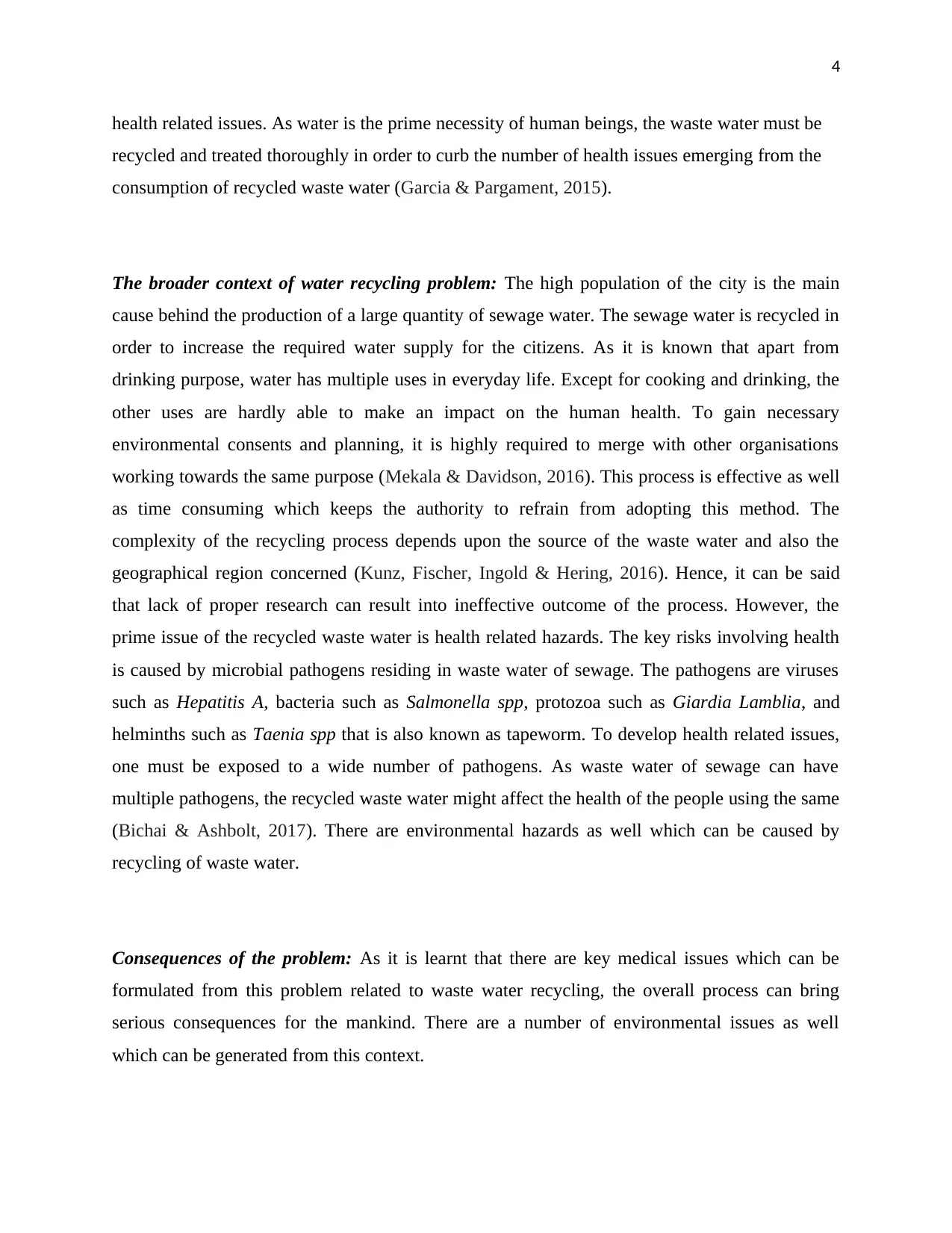
4
health related issues. As water is the prime necessity of human beings, the waste water must be
recycled and treated thoroughly in order to curb the number of health issues emerging from the
consumption of recycled waste water (Garcia & Pargament, 2015).
The broader context of water recycling problem: The high population of the city is the main
cause behind the production of a large quantity of sewage water. The sewage water is recycled in
order to increase the required water supply for the citizens. As it is known that apart from
drinking purpose, water has multiple uses in everyday life. Except for cooking and drinking, the
other uses are hardly able to make an impact on the human health. To gain necessary
environmental consents and planning, it is highly required to merge with other organisations
working towards the same purpose (Mekala & Davidson, 2016). This process is effective as well
as time consuming which keeps the authority to refrain from adopting this method. The
complexity of the recycling process depends upon the source of the waste water and also the
geographical region concerned (Kunz, Fischer, Ingold & Hering, 2016). Hence, it can be said
that lack of proper research can result into ineffective outcome of the process. However, the
prime issue of the recycled waste water is health related hazards. The key risks involving health
is caused by microbial pathogens residing in waste water of sewage. The pathogens are viruses
such as Hepatitis A, bacteria such as Salmonella spp, protozoa such as Giardia Lamblia, and
helminths such as Taenia spp that is also known as tapeworm. To develop health related issues,
one must be exposed to a wide number of pathogens. As waste water of sewage can have
multiple pathogens, the recycled waste water might affect the health of the people using the same
(Bichai & Ashbolt, 2017). There are environmental hazards as well which can be caused by
recycling of waste water.
Consequences of the problem: As it is learnt that there are key medical issues which can be
formulated from this problem related to waste water recycling, the overall process can bring
serious consequences for the mankind. There are a number of environmental issues as well
which can be generated from this context.
health related issues. As water is the prime necessity of human beings, the waste water must be
recycled and treated thoroughly in order to curb the number of health issues emerging from the
consumption of recycled waste water (Garcia & Pargament, 2015).
The broader context of water recycling problem: The high population of the city is the main
cause behind the production of a large quantity of sewage water. The sewage water is recycled in
order to increase the required water supply for the citizens. As it is known that apart from
drinking purpose, water has multiple uses in everyday life. Except for cooking and drinking, the
other uses are hardly able to make an impact on the human health. To gain necessary
environmental consents and planning, it is highly required to merge with other organisations
working towards the same purpose (Mekala & Davidson, 2016). This process is effective as well
as time consuming which keeps the authority to refrain from adopting this method. The
complexity of the recycling process depends upon the source of the waste water and also the
geographical region concerned (Kunz, Fischer, Ingold & Hering, 2016). Hence, it can be said
that lack of proper research can result into ineffective outcome of the process. However, the
prime issue of the recycled waste water is health related hazards. The key risks involving health
is caused by microbial pathogens residing in waste water of sewage. The pathogens are viruses
such as Hepatitis A, bacteria such as Salmonella spp, protozoa such as Giardia Lamblia, and
helminths such as Taenia spp that is also known as tapeworm. To develop health related issues,
one must be exposed to a wide number of pathogens. As waste water of sewage can have
multiple pathogens, the recycled waste water might affect the health of the people using the same
(Bichai & Ashbolt, 2017). There are environmental hazards as well which can be caused by
recycling of waste water.
Consequences of the problem: As it is learnt that there are key medical issues which can be
formulated from this problem related to waste water recycling, the overall process can bring
serious consequences for the mankind. There are a number of environmental issues as well
which can be generated from this context.
Paraphrase This Document
Need a fresh take? Get an instant paraphrase of this document with our AI Paraphraser
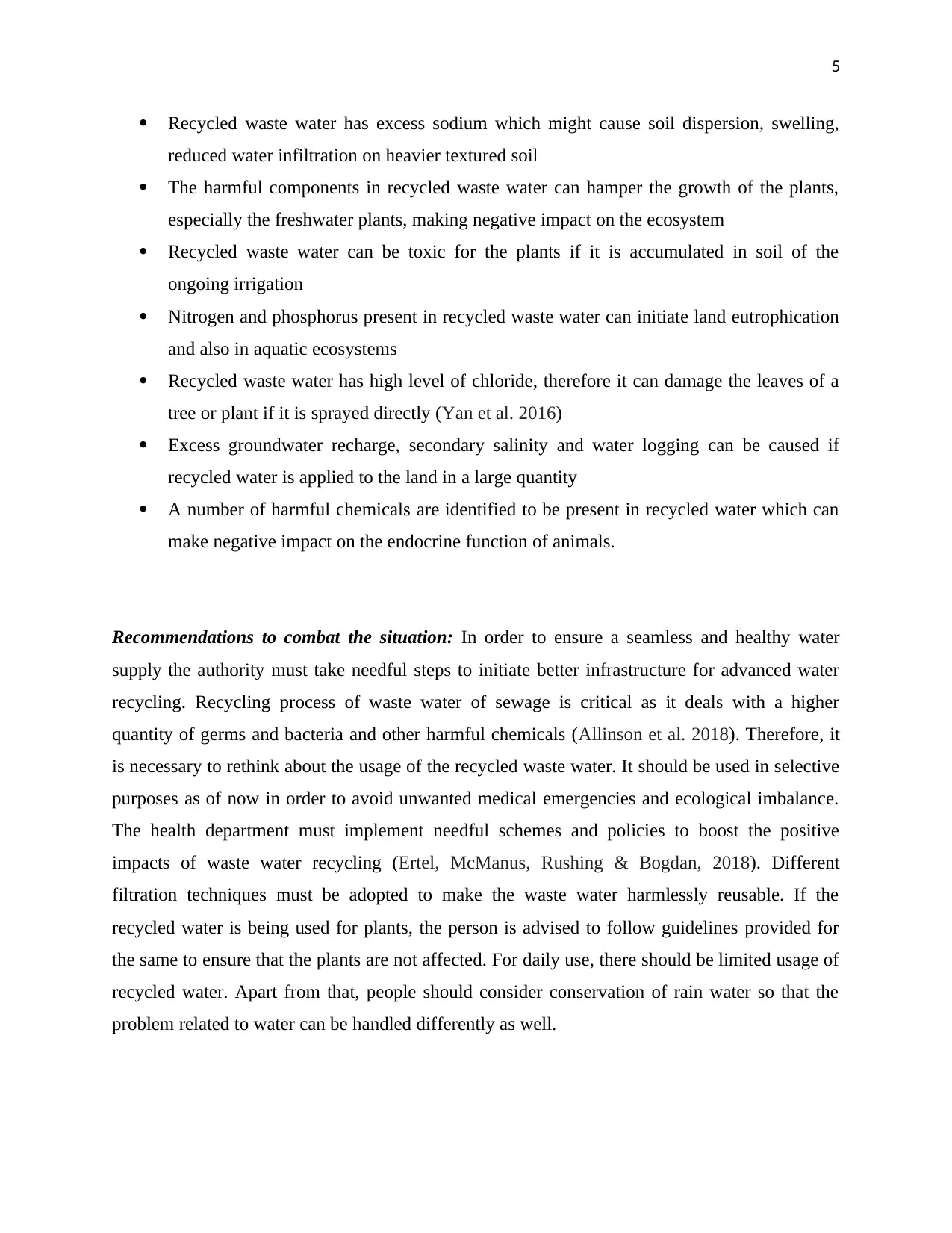
5
Recycled waste water has excess sodium which might cause soil dispersion, swelling,
reduced water infiltration on heavier textured soil
The harmful components in recycled waste water can hamper the growth of the plants,
especially the freshwater plants, making negative impact on the ecosystem
Recycled waste water can be toxic for the plants if it is accumulated in soil of the
ongoing irrigation
Nitrogen and phosphorus present in recycled waste water can initiate land eutrophication
and also in aquatic ecosystems
Recycled waste water has high level of chloride, therefore it can damage the leaves of a
tree or plant if it is sprayed directly (Yan et al. 2016)
Excess groundwater recharge, secondary salinity and water logging can be caused if
recycled water is applied to the land in a large quantity
A number of harmful chemicals are identified to be present in recycled water which can
make negative impact on the endocrine function of animals.
Recommendations to combat the situation: In order to ensure a seamless and healthy water
supply the authority must take needful steps to initiate better infrastructure for advanced water
recycling. Recycling process of waste water of sewage is critical as it deals with a higher
quantity of germs and bacteria and other harmful chemicals (Allinson et al. 2018). Therefore, it
is necessary to rethink about the usage of the recycled waste water. It should be used in selective
purposes as of now in order to avoid unwanted medical emergencies and ecological imbalance.
The health department must implement needful schemes and policies to boost the positive
impacts of waste water recycling (Ertel, McManus, Rushing & Bogdan, 2018). Different
filtration techniques must be adopted to make the waste water harmlessly reusable. If the
recycled water is being used for plants, the person is advised to follow guidelines provided for
the same to ensure that the plants are not affected. For daily use, there should be limited usage of
recycled water. Apart from that, people should consider conservation of rain water so that the
problem related to water can be handled differently as well.
Recycled waste water has excess sodium which might cause soil dispersion, swelling,
reduced water infiltration on heavier textured soil
The harmful components in recycled waste water can hamper the growth of the plants,
especially the freshwater plants, making negative impact on the ecosystem
Recycled waste water can be toxic for the plants if it is accumulated in soil of the
ongoing irrigation
Nitrogen and phosphorus present in recycled waste water can initiate land eutrophication
and also in aquatic ecosystems
Recycled waste water has high level of chloride, therefore it can damage the leaves of a
tree or plant if it is sprayed directly (Yan et al. 2016)
Excess groundwater recharge, secondary salinity and water logging can be caused if
recycled water is applied to the land in a large quantity
A number of harmful chemicals are identified to be present in recycled water which can
make negative impact on the endocrine function of animals.
Recommendations to combat the situation: In order to ensure a seamless and healthy water
supply the authority must take needful steps to initiate better infrastructure for advanced water
recycling. Recycling process of waste water of sewage is critical as it deals with a higher
quantity of germs and bacteria and other harmful chemicals (Allinson et al. 2018). Therefore, it
is necessary to rethink about the usage of the recycled waste water. It should be used in selective
purposes as of now in order to avoid unwanted medical emergencies and ecological imbalance.
The health department must implement needful schemes and policies to boost the positive
impacts of waste water recycling (Ertel, McManus, Rushing & Bogdan, 2018). Different
filtration techniques must be adopted to make the waste water harmlessly reusable. If the
recycled water is being used for plants, the person is advised to follow guidelines provided for
the same to ensure that the plants are not affected. For daily use, there should be limited usage of
recycled water. Apart from that, people should consider conservation of rain water so that the
problem related to water can be handled differently as well.
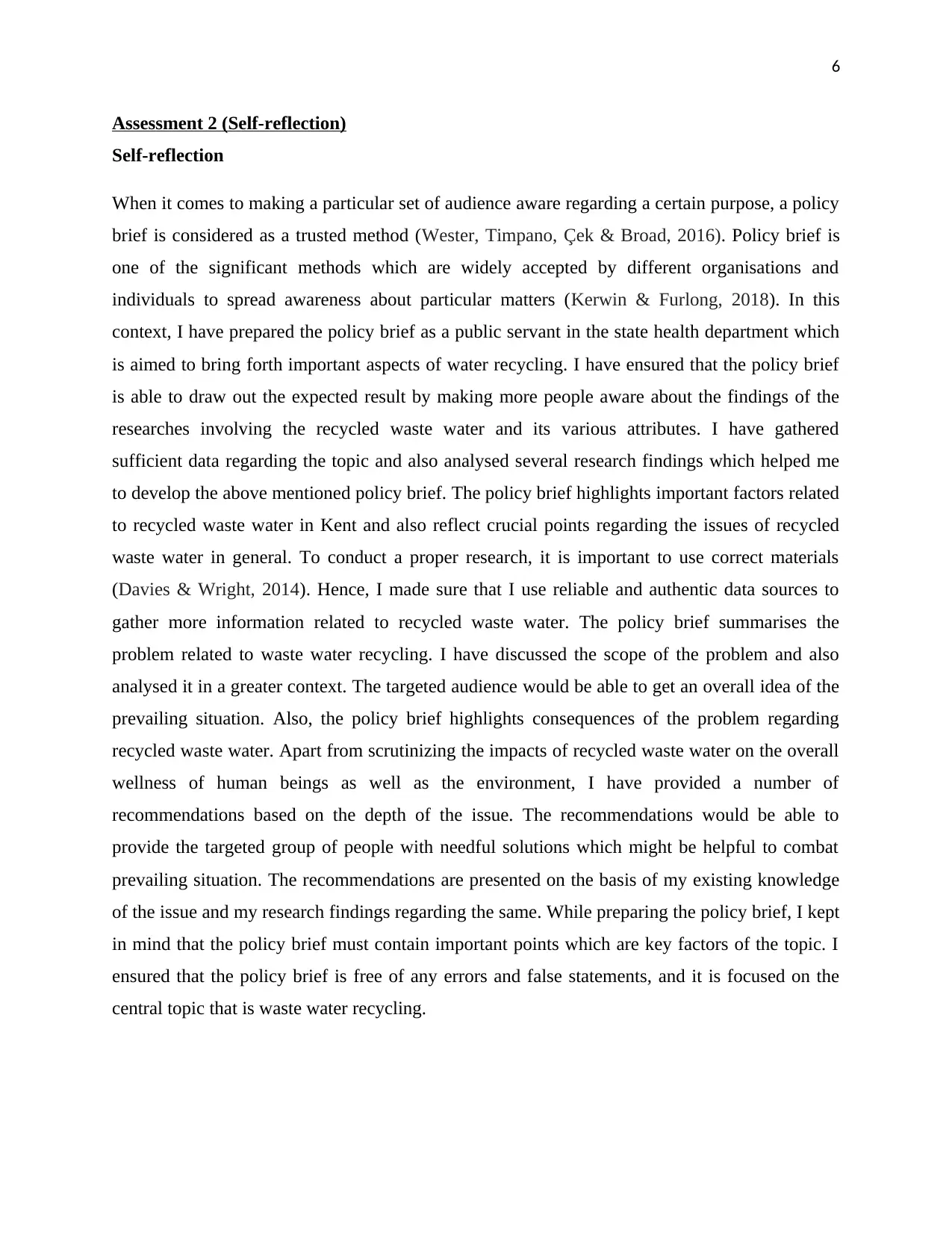
6
Assessment 2 (Self-reflection)
Self-reflection
When it comes to making a particular set of audience aware regarding a certain purpose, a policy
brief is considered as a trusted method (Wester, Timpano, Çek & Broad, 2016). Policy brief is
one of the significant methods which are widely accepted by different organisations and
individuals to spread awareness about particular matters (Kerwin & Furlong, 2018). In this
context, I have prepared the policy brief as a public servant in the state health department which
is aimed to bring forth important aspects of water recycling. I have ensured that the policy brief
is able to draw out the expected result by making more people aware about the findings of the
researches involving the recycled waste water and its various attributes. I have gathered
sufficient data regarding the topic and also analysed several research findings which helped me
to develop the above mentioned policy brief. The policy brief highlights important factors related
to recycled waste water in Kent and also reflect crucial points regarding the issues of recycled
waste water in general. To conduct a proper research, it is important to use correct materials
(Davies & Wright, 2014). Hence, I made sure that I use reliable and authentic data sources to
gather more information related to recycled waste water. The policy brief summarises the
problem related to waste water recycling. I have discussed the scope of the problem and also
analysed it in a greater context. The targeted audience would be able to get an overall idea of the
prevailing situation. Also, the policy brief highlights consequences of the problem regarding
recycled waste water. Apart from scrutinizing the impacts of recycled waste water on the overall
wellness of human beings as well as the environment, I have provided a number of
recommendations based on the depth of the issue. The recommendations would be able to
provide the targeted group of people with needful solutions which might be helpful to combat
prevailing situation. The recommendations are presented on the basis of my existing knowledge
of the issue and my research findings regarding the same. While preparing the policy brief, I kept
in mind that the policy brief must contain important points which are key factors of the topic. I
ensured that the policy brief is free of any errors and false statements, and it is focused on the
central topic that is waste water recycling.
Assessment 2 (Self-reflection)
Self-reflection
When it comes to making a particular set of audience aware regarding a certain purpose, a policy
brief is considered as a trusted method (Wester, Timpano, Çek & Broad, 2016). Policy brief is
one of the significant methods which are widely accepted by different organisations and
individuals to spread awareness about particular matters (Kerwin & Furlong, 2018). In this
context, I have prepared the policy brief as a public servant in the state health department which
is aimed to bring forth important aspects of water recycling. I have ensured that the policy brief
is able to draw out the expected result by making more people aware about the findings of the
researches involving the recycled waste water and its various attributes. I have gathered
sufficient data regarding the topic and also analysed several research findings which helped me
to develop the above mentioned policy brief. The policy brief highlights important factors related
to recycled waste water in Kent and also reflect crucial points regarding the issues of recycled
waste water in general. To conduct a proper research, it is important to use correct materials
(Davies & Wright, 2014). Hence, I made sure that I use reliable and authentic data sources to
gather more information related to recycled waste water. The policy brief summarises the
problem related to waste water recycling. I have discussed the scope of the problem and also
analysed it in a greater context. The targeted audience would be able to get an overall idea of the
prevailing situation. Also, the policy brief highlights consequences of the problem regarding
recycled waste water. Apart from scrutinizing the impacts of recycled waste water on the overall
wellness of human beings as well as the environment, I have provided a number of
recommendations based on the depth of the issue. The recommendations would be able to
provide the targeted group of people with needful solutions which might be helpful to combat
prevailing situation. The recommendations are presented on the basis of my existing knowledge
of the issue and my research findings regarding the same. While preparing the policy brief, I kept
in mind that the policy brief must contain important points which are key factors of the topic. I
ensured that the policy brief is free of any errors and false statements, and it is focused on the
central topic that is waste water recycling.
⊘ This is a preview!⊘
Do you want full access?
Subscribe today to unlock all pages.

Trusted by 1+ million students worldwide
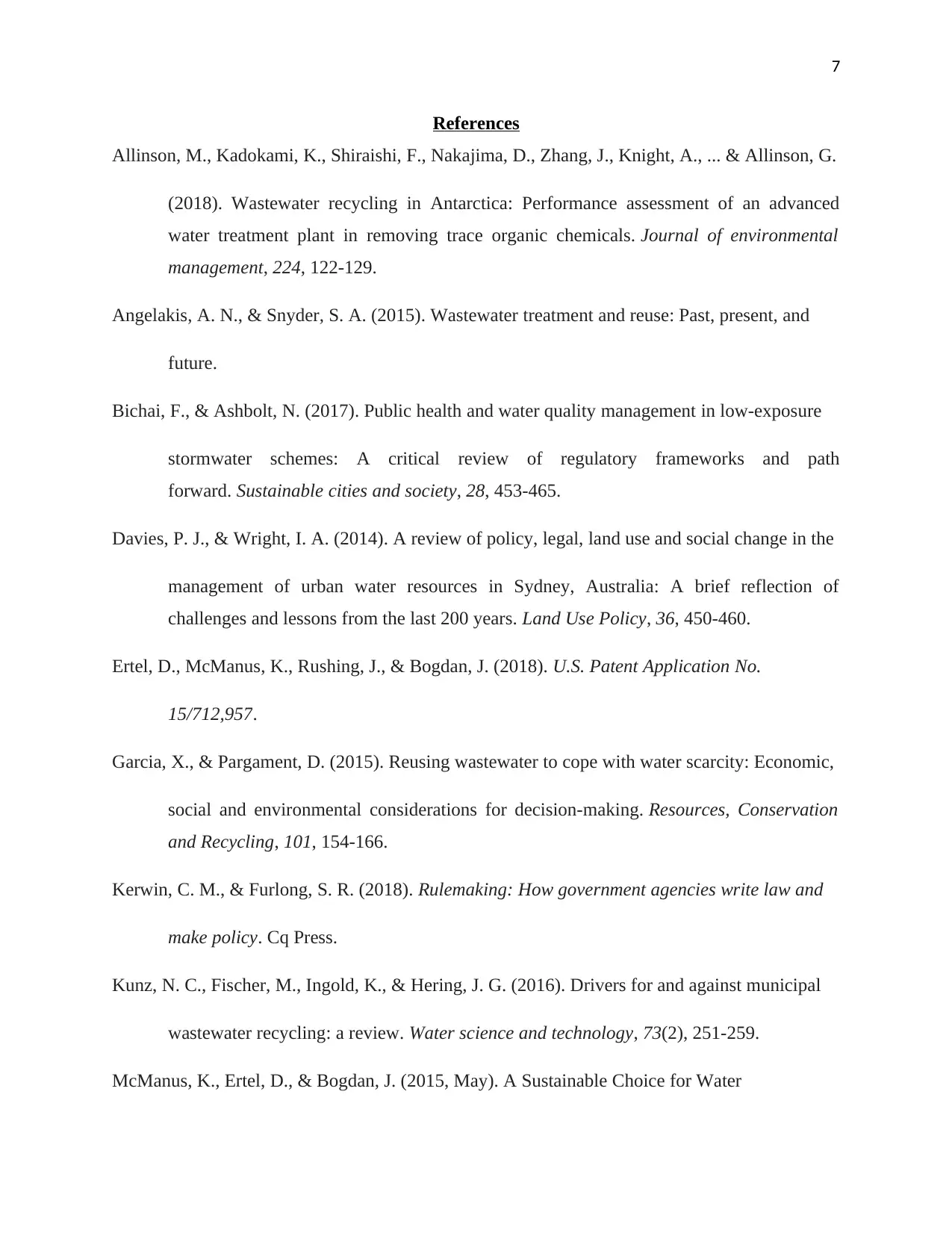
7
References
Allinson, M., Kadokami, K., Shiraishi, F., Nakajima, D., Zhang, J., Knight, A., ... & Allinson, G.
(2018). Wastewater recycling in Antarctica: Performance assessment of an advanced
water treatment plant in removing trace organic chemicals. Journal of environmental
management, 224, 122-129.
Angelakis, A. N., & Snyder, S. A. (2015). Wastewater treatment and reuse: Past, present, and
future.
Bichai, F., & Ashbolt, N. (2017). Public health and water quality management in low-exposure
stormwater schemes: A critical review of regulatory frameworks and path
forward. Sustainable cities and society, 28, 453-465.
Davies, P. J., & Wright, I. A. (2014). A review of policy, legal, land use and social change in the
management of urban water resources in Sydney, Australia: A brief reflection of
challenges and lessons from the last 200 years. Land Use Policy, 36, 450-460.
Ertel, D., McManus, K., Rushing, J., & Bogdan, J. (2018). U.S. Patent Application No.
15/712,957.
Garcia, X., & Pargament, D. (2015). Reusing wastewater to cope with water scarcity: Economic,
social and environmental considerations for decision-making. Resources, Conservation
and Recycling, 101, 154-166.
Kerwin, C. M., & Furlong, S. R. (2018). Rulemaking: How government agencies write law and
make policy. Cq Press.
Kunz, N. C., Fischer, M., Ingold, K., & Hering, J. G. (2016). Drivers for and against municipal
wastewater recycling: a review. Water science and technology, 73(2), 251-259.
McManus, K., Ertel, D., & Bogdan, J. (2015, May). A Sustainable Choice for Water
References
Allinson, M., Kadokami, K., Shiraishi, F., Nakajima, D., Zhang, J., Knight, A., ... & Allinson, G.
(2018). Wastewater recycling in Antarctica: Performance assessment of an advanced
water treatment plant in removing trace organic chemicals. Journal of environmental
management, 224, 122-129.
Angelakis, A. N., & Snyder, S. A. (2015). Wastewater treatment and reuse: Past, present, and
future.
Bichai, F., & Ashbolt, N. (2017). Public health and water quality management in low-exposure
stormwater schemes: A critical review of regulatory frameworks and path
forward. Sustainable cities and society, 28, 453-465.
Davies, P. J., & Wright, I. A. (2014). A review of policy, legal, land use and social change in the
management of urban water resources in Sydney, Australia: A brief reflection of
challenges and lessons from the last 200 years. Land Use Policy, 36, 450-460.
Ertel, D., McManus, K., Rushing, J., & Bogdan, J. (2018). U.S. Patent Application No.
15/712,957.
Garcia, X., & Pargament, D. (2015). Reusing wastewater to cope with water scarcity: Economic,
social and environmental considerations for decision-making. Resources, Conservation
and Recycling, 101, 154-166.
Kerwin, C. M., & Furlong, S. R. (2018). Rulemaking: How government agencies write law and
make policy. Cq Press.
Kunz, N. C., Fischer, M., Ingold, K., & Hering, J. G. (2016). Drivers for and against municipal
wastewater recycling: a review. Water science and technology, 73(2), 251-259.
McManus, K., Ertel, D., & Bogdan, J. (2015, May). A Sustainable Choice for Water
Paraphrase This Document
Need a fresh take? Get an instant paraphrase of this document with our AI Paraphraser
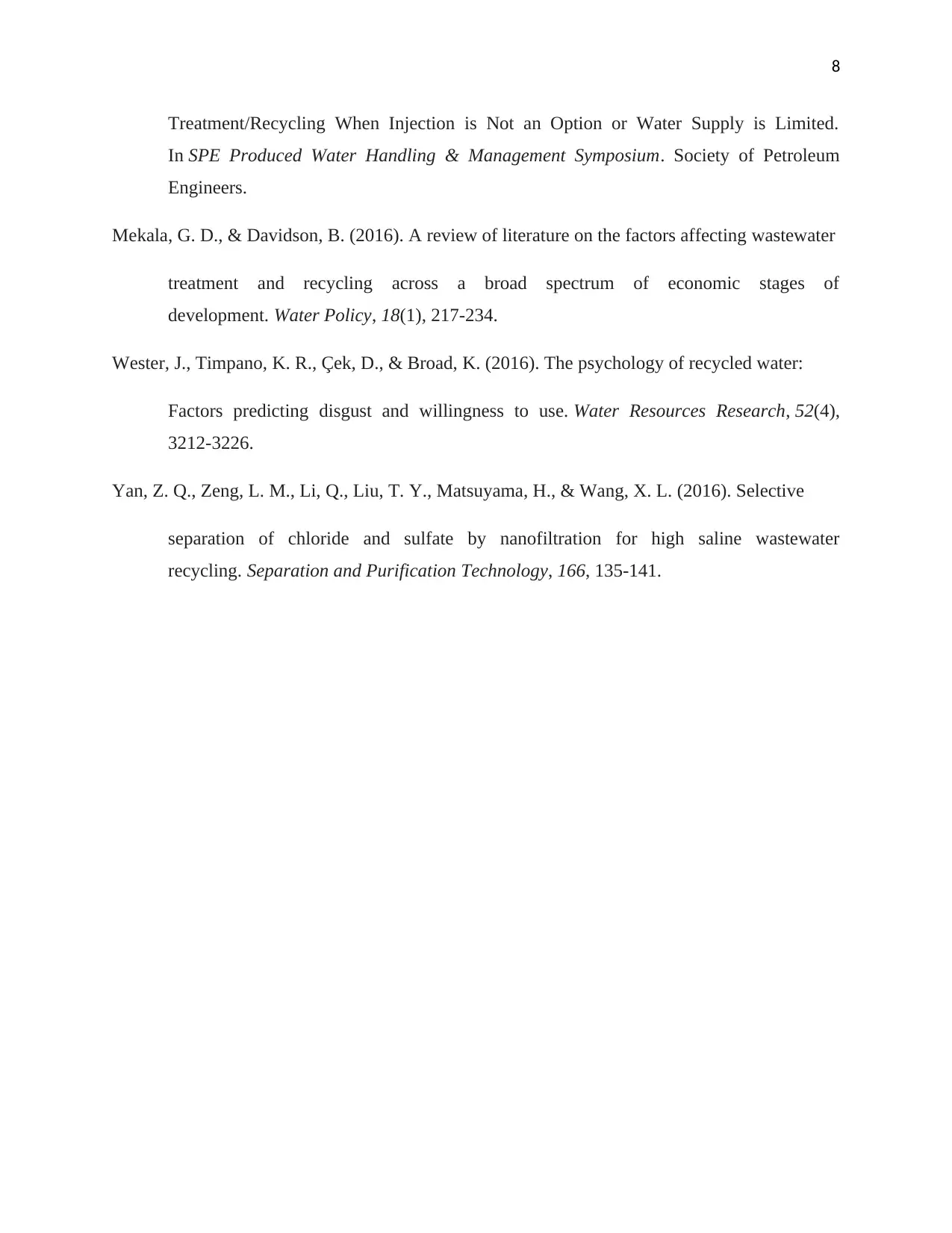
8
Treatment/Recycling When Injection is Not an Option or Water Supply is Limited.
In SPE Produced Water Handling & Management Symposium. Society of Petroleum
Engineers.
Mekala, G. D., & Davidson, B. (2016). A review of literature on the factors affecting wastewater
treatment and recycling across a broad spectrum of economic stages of
development. Water Policy, 18(1), 217-234.
Wester, J., Timpano, K. R., Çek, D., & Broad, K. (2016). The psychology of recycled water:
Factors predicting disgust and willingness to use. Water Resources Research, 52(4),
3212-3226.
Yan, Z. Q., Zeng, L. M., Li, Q., Liu, T. Y., Matsuyama, H., & Wang, X. L. (2016). Selective
separation of chloride and sulfate by nanofiltration for high saline wastewater
recycling. Separation and Purification Technology, 166, 135-141.
Treatment/Recycling When Injection is Not an Option or Water Supply is Limited.
In SPE Produced Water Handling & Management Symposium. Society of Petroleum
Engineers.
Mekala, G. D., & Davidson, B. (2016). A review of literature on the factors affecting wastewater
treatment and recycling across a broad spectrum of economic stages of
development. Water Policy, 18(1), 217-234.
Wester, J., Timpano, K. R., Çek, D., & Broad, K. (2016). The psychology of recycled water:
Factors predicting disgust and willingness to use. Water Resources Research, 52(4),
3212-3226.
Yan, Z. Q., Zeng, L. M., Li, Q., Liu, T. Y., Matsuyama, H., & Wang, X. L. (2016). Selective
separation of chloride and sulfate by nanofiltration for high saline wastewater
recycling. Separation and Purification Technology, 166, 135-141.
1 out of 8
Related Documents
Your All-in-One AI-Powered Toolkit for Academic Success.
+13062052269
info@desklib.com
Available 24*7 on WhatsApp / Email
![[object Object]](/_next/static/media/star-bottom.7253800d.svg)
Unlock your academic potential
Copyright © 2020–2025 A2Z Services. All Rights Reserved. Developed and managed by ZUCOL.





